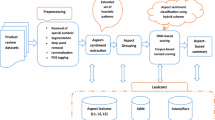Abstract
Over the last few years, the way people express their opinions has changed dramatically with the progress of social networks, web communities, blogs, wikis, and other online collaborative media. Now, people buy a product and express their opinion in social media so that other people can acquire knowledge about that product before they proceed to buy it. On the other hand, for the companies it has become necessary to keep track of the public opinions on their products to achieve customer satisfaction. Therefore, nowadays opinion mining is a routine task for every company for developing a widely acceptable product or providing satisfactory service. Concept-based opinion mining is a new area of research. The key parts of this research involve extraction of concepts from the text, determining product aspects, and identifying sentiment associated with these aspects. In this paper, we address each one of these tasks using a novel approach that takes text as input and use dependency parse tree-based rules to extract concepts and aspects and identify the associated sentiment. On the benchmark datasets, our method outperforms all existing state-of-the-art systems.
Access this chapter
Tax calculation will be finalised at checkout
Purchases are for personal use only
Similar content being viewed by others
Notes
- 1.
We used the Stanford Dependency parser, http://nlp.stanford.edu/software/lex- parser.shtml.
- 2.
References
Poria, S., Gelbukh, A., Hussain, A., Howard, N., Das, D., Bandyopadhyay, S.: Enhanced SenticNet with affective labels for concept-based opinion mining. IEEE Intell. Syst. 28(2), 31–38 (2013)
Poria, S., Gelbukh, A., Cambria, E., Hussain, A., Huang, G.B.: EmoSenticSpace: A novel framework for affective common-sense reasoning. Knowl.-Based Syst. (2014)
Cambria, E., Rajagopal, D., Olsher, D., Das, D.: Big social data analysis. Big Data Computing. Chapman and Hall/CRC, Boca Raton (2013)
Cambria, E., Hussain, A., Havasi, C., Eckl, C., Munro, J.: Towards crowd validation of the UK national health service. In: WebSci10 (2010)
Poria, S., Agarwal, B., Gelbukh, A., Hussain, A., Howard, N.: Dependency-based semantic parsing for concept-level text analysis. In: Gelbukh, A. (ed.) CICLing 2014, Part I. LNCS, vol. 8403, pp. 113–127. Springer, Heidelberg (2014)
Socher, R., Perelygin, A., Wu, J.Y., Chuang, J., Manning, C.D., Ng, A.Y., Potts, C.: Recursive deep models for semantic compositionality over a sentiment treebank. In: Conference on Empirical Methods in Natural Language Processing (EMNLP) (2013)
Poria, S., Cambria, E., Ku, L.W., Gui, C., Gelbukh, A.: A rule-based approach to aspect extraction from product reviews. In: Workshop Proceedings of the 25th International Conference on Computational Linguistics, COLING 2014 (2014)
Cruz-Garcia, I.O., Gelbukh, A., Sidorov, G.: Implicit aspect indicator extraction for aspect-based opinion mining (2014) (Submitted)
Qiu, G., Liu, B., Bu, J., Chen, C.: Opinion word expansion and target extraction through double propagation. Comput. Linguist. 37(1), 9–27 (2011)
Cambria, E., Olsher, D., Rajagopal, D.: Senticnet 3: A common and common-sense knowledge base for cognition-driven sentiment analysis. In: AAAI (2014)
Poria, S., Gelbukh, A., Cambria, E., Yang, P., Hussain, A., Durrani, T.: merging SenticNet and wordnet-affect emotion lists for sentiment analysis. In: 11th International Conference on Signal Processing (ICSP 2012), vol. 2, pp. 1251–1255. IEEE (2012)
Poria, S., Gelbukh, A., Cambria, E., Das, D., Bandyopadhyay, S.: Enriching SenticNet polarity scores through semi-supervised fuzzy clustering. In: 12th International Conference on Data Mining Workshops (ICDMW 2012), pp. 709–716. IEEE (2012)
Castro-Manzano, J.M.: A defeasible logic of intention. In: Batyrshin, I., González Mendoza, M. (eds.) MICAI 2012, Part I. LNCS, vol. 7629, pp. 321–333. Springer, Heidelberg (2013)
Poria, S., Cambria, E., Winterstein, G., Huang, G.B.: Sentic patterns: Dependency-based rules for concept-level sentiment analysis. Knowl.-Based Syst. (2014). doi:10.1016/j.knosys.2014.05.005
Pakray, P., Pal, S., Poria, S., Bandyopadhyay, S., Gelbukh, A.: JU_CSE_TAC: Textual entailment recognition system at TAC RTE-6. In: System Report, Text Analysis Conference Recognizing Textual Entailment Track (TAC RTE), Notebook (2010)
Pakray, P., Neogi, S., Bhaskar, P., Poria, S., Bandyopadhyay, S., Gelbukh, A.: A textual entailment system using anaphora resolution. In: System Report. Text Analysis Conference Recognizing Textual Entailment Track (TAC RTE), Notebook (2011)
Ofek, N., Rokach, L., Mitra, P.: Methodology for connecting nouns to their modifying adjectives. In: Gelbukh, A. (ed.) CICLing 2014, Part I. LNCS, vol. 8403, pp. 271–284. Springer, Heidelberg (2014)
Author information
Authors and Affiliations
Corresponding author
Editor information
Editors and Affiliations
Rights and permissions
Copyright information
© 2014 Springer International Publishing Switzerland
About this paper
Cite this paper
Poria, S., Ofek, N., Gelbukh, A., Hussain, A., Rokach, L. (2014). Dependency Tree-Based Rules for Concept-Level Aspect-Based Sentiment Analysis. In: Presutti, V., et al. Semantic Web Evaluation Challenge. SemWebEval 2014. Communications in Computer and Information Science, vol 475. Springer, Cham. https://doi.org/10.1007/978-3-319-12024-9_5
Download citation
DOI: https://doi.org/10.1007/978-3-319-12024-9_5
Published:
Publisher Name: Springer, Cham
Print ISBN: 978-3-319-12023-2
Online ISBN: 978-3-319-12024-9
eBook Packages: Computer ScienceComputer Science (R0)




